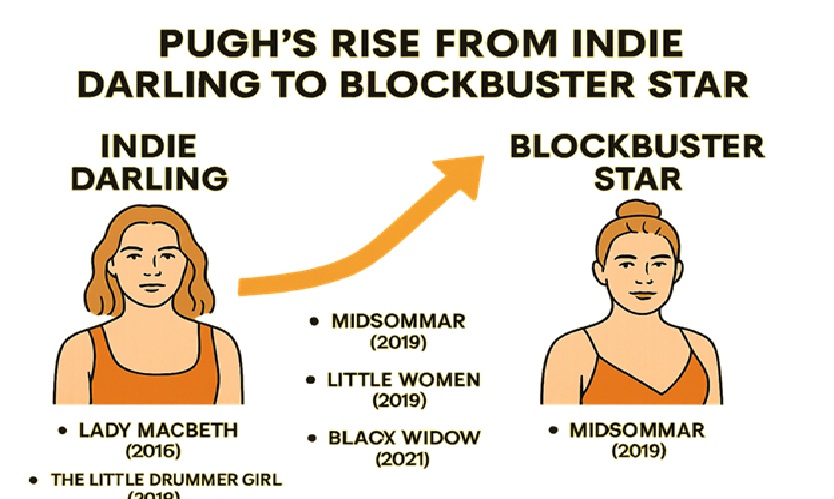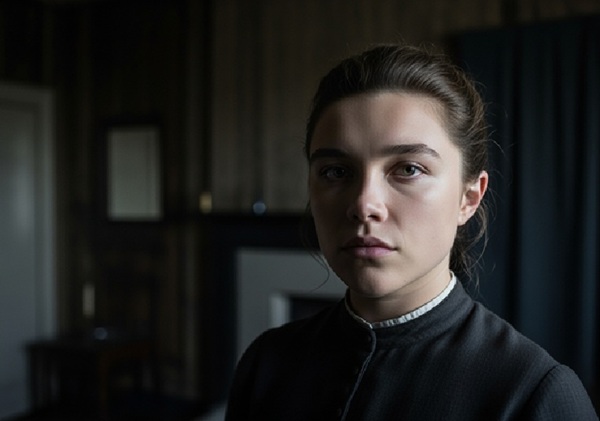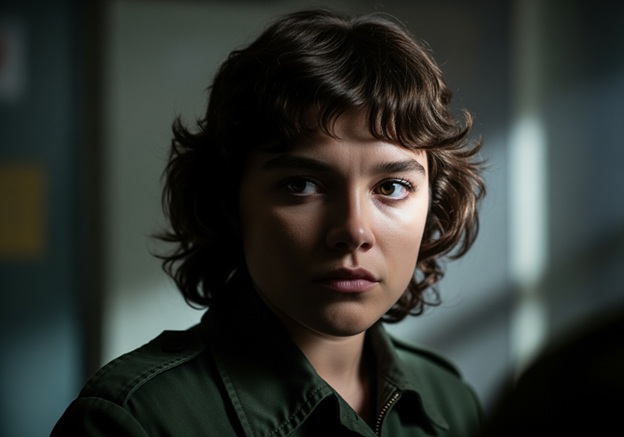Decoding the Florence Pugh Nude Scene: More Than Meets the Eye
Florence Pugh has rapidly become one of Hollywood’s most compelling A-list actresses. She is celebrated for her powerful and fearless performances. Many of her roles have included moments of on-screen nudity.
But for Pugh, these scenes are more than just nudity. They are artistic choices. They add deep meaning to her characters. They also support the overall story. Her work often sends a message about body positivity in a tough industry.
We will explore Florence Pugh’s unique journey. We will look closely at seven of her most noted on-screen moments. We aim to understand the art behind these scenes. We will also see how her work has changed talks about celebrities, art, and the human body. Come with us as we find the true artistry that shapes Florence Pugh’s career.

When we dig into Florence Pugh’s on-screen nudity, it’s crucial to move beyond a superficial glance and explore the profound artistic intent behind these portrayals. Unlike gratuitous or exploitative depictions, Pugh’s nude scenes are consistently integrated into the character’s psychology, the director’s vision, and the overarching narrative. They are not mere spectacles but rather integral components that serve to deepen our understanding of the characters and the themes at play.
For Pugh, nudity is a tool for vulnerable storytelling. It strips away pretense, exposing characters in their most raw and authentic states. This commitment to authenticity is a hallmark of her performances, from her early work in indie films to her roles in major blockbusters. Her approach often embodies a philosophy that rejects exploitation, emphasizing the emotional and psychological context over sensationalism. This is particularly evident when considering the historical context of the stories she tells, where vulnerability and the human body are often central to the narrative, as seen in period pieces like ‘Lady Macbeth’ or ‘Outlaw King’.
Furthermore, Pugh’s work often aligns with the concept of the ‘female gaze,’ where the portrayal of the female body is not solely for male consumption but rather to convey the character’s inner experience, agency, or vulnerability from a more empathetic and nuanced perspective. This conscious choice allows her to challenge traditional cinematic norms and contribute to a more progressive representation of women on screen. It’s a testament to her dedication that even in her earliest roles, such as her appearances in ‘Marcella’ in 2016 when she was just 20 years old, or her latest in ‘We Live in Time’ in 2024 at 28, her approach to nudity has consistently been driven by narrative necessity rather than sensationalism. This consistent artistic integrity is a significant factor in why her work resonates so deeply with audiences and critics alike.
From ‘Lady Macbeth’ to ‘Oppenheimer’: A Commitment to Vulnerable Storytelling
Florence Pugh’s career trajectory showcases a remarkable commitment to vulnerable and complex storytelling, where on-screen nudity often plays a pivotal, non-exploitative role. Her journey began with critically acclaimed independent films that laid the groundwork for her fearless approach to acting.
In ‘Lady Macbeth’ (2016), her breakout role, Pugh’s portrayal of Katherine Lester was uninhibited, using nudity to convey the character’s burgeoning sexuality and rebellion against societal constraints. This was not about titillation but about illustrating a woman’s awakening and defiance in a repressive 19th-century setting.
Similarly, in ‘Outlaw King’ (2018), her scenes as Elizabeth de Burgh were crucial for establishing the raw, unvarnished reality of medieval life and the power dynamics within a marriage of convenience. The vulnerability displayed served to humanize a historical figure, making her relatable despite the grand historical backdrop.
‘The Little Drummer Girl’ (2018) saw her steer the complex world of espionage, where intimacy and exposure were often tools of psychological manipulation. Her performance, guided by director Park Chan-wook, used nudity to underscore the character’s perilous journey and the blurring lines between her true self and her undercover persona.
Even in more recent, high-profile films like ‘Don’t Worry Darling’ (2022) and ‘Oppenheimer’ (2023), Pugh has maintained this commitment. In ‘Don’t Worry Darling,’ her character Alice’s journey into the unsettling truths of her reality often involved moments of vulnerability, including nudity, that were essential to conveying her psychological solveing and eventual rebellion. In ‘Oppenheimer,’ her scenes as Jean Tatlock were not merely decorative but served to illustrate the passionate, tumultuous, and ultimately tragic relationship between Tatlock and J. Robert Oppenheimer, adding depth to the historical narrative.
Across these diverse roles, Florence Pugh consistently demonstrates that nudity, when handled with artistic integrity, can be a powerful narrative device, enhancing character development and thematic resonance rather than detracting from it. Her career is a testament to an actress who prioritizes the story and the emotional truth of her characters above all else, earning her widespread critical acclaim and solidifying her status as one of her generation’s most compelling performers.
Analyzing the Florence Pugh Nude Controversy and Conversation
Florence Pugh’s willingness to engage with nudity in her roles has, perhaps inevitably, sparked considerable public reaction and media commentary. While many critics and audiences laud her for her bravery and artistic integrity, others, particularly online, have engaged in body-shaming and inappropriate discussions. This dichotomy highlights the ongoing societal struggle with female agency and representation in media.
A significant moment that encapsulated this conversation was the infamous Valentino dress incident in 2022. Pugh wore a sheer pink gown that revealed her breasts at a Valentino fashion show, leading to a deluge of online criticism and objectification. Her powerful and articulate response to the backlash, where she condemned the casual misogyny and body-shaming, resonated widely. She stated, “What’s been interesting to watch and witness is just how easy it is for men to totally destroy a woman’s body, publicly, proudly, for everyone to see.” This incident, while not directly related to her on-screen nude scenes, became a powerful extension of the conversation around her body and public perception. It underscored her consistent stance on body positivity and her refusal to conform to restrictive societal expectations.
Pugh has frequently discussed and addressed her experiences with nudity throughout her career. In interviews, she consistently emphasizes that her choices regarding Florence Pugh nude scenes are driven by the script and character, not by a desire for sensationalism. She has spoken about the importance of feeling safe and respected on set during intimate scenes, often praising the use of intimacy coordinators. Her candor about the challenges and responsibilities of portraying vulnerability on screen has contributed to a more open dialogue within the industry about consent, boundaries, and the artistic purpose of nudity.
The public and critical reactions to her nude scenes are varied. While some segments of the internet focus on explicit content, the broader critical reception often praises her for her courage and the authenticity she brings to her roles. Her ability to lift potentially controversial scenes into moments of genuine artistic merit has garnered her respect. This ongoing conversation around Florence Pugh’s nudity serves as a microcosm of larger debates about celebrity privacy, female objectification, and the evolving ethics of portraying the human body in film and television. Her unwavering stance has made her an inadvertent, yet powerful, advocate for body autonomy and respectful representation.
A Scene-by-Scene Breakdown: Pugh’s 7 Most Defining On-Screen Moments
Florence Pugh’s filmography is punctuated by powerful performances, many of which include moments of nudity that are integral to the narrative and character development. Here, we break down seven of her most defining on-screen moments, analyzing the artistic purpose behind each.
1. ‘Lady Macbeth’ (2016): The Birth of a Bold Performer

In William Oldroyd’s ‘Lady Macbeth’, Florence Pugh delivered a breakout performance as Katherine Lester, a young woman sold into a loveless marriage in 19th-century rural England. Her nude scenes in this film are not about titillation but are a raw and potent expression of her character’s defiance and burgeoning sexuality. Trapped in a suffocating existence, Katherine finds liberation and agency through illicit affairs, and her physical abandonment in these moments symbolizes her psychological escape from societal and marital constraints. The nudity here is stark, unflinching, and serves to underscore Katherine’s radical rebellion against the repressive norms of her time. It showcases her raw power and determination to seize control of her own life, establishing Pugh as a bold and fearless performer from the very beginning of her career. The scenes are crucial for understanding Katherine’s change from a submissive bride to a cunning and ruthless individual.
2. ‘Outlaw King’ (2018): A Royal Wedding Night
In David Mackenzie’s historical epic ‘Outlaw King’, Florence Pugh portrays Elizabeth de Burgh, the second wife of Robert the Bruce (Chris Pine). The film includes a notable scene on their wedding night where both characters are nude. This particular scene is lauded for its grounded portrayal of intimacy in a historical context, avoiding romanticized clichés. The nudity here serves to establish the immediate and authentic connection between Robert and Elizabeth, despite their arranged marriage. It depicts a raw, vulnerable moment that humanizes these historical figures, stripping away their royal facade to reveal their shared humanity and the beginnings of a genuine bond. The scene emphasizes the physical reality of their union and the power dynamics at play, setting the stage for their evolving relationship amidst the brutal backdrop of war and political upheaval. It’s a moment of quiet intimacy that grounds the epic narrative in relatable human experience, showcasing the vulnerability and trust that begins to form between them.
3. ‘The Little Drummer Girl’ (2018): Seduction and Espionage

In the AMC miniseries ‘The Little Drummer Girl’, directed by the acclaimed Park Chan-wook, Florence Pugh plays Charlie Ross, a young actress who is drawn into a complex web of espionage. Her nude scenes in this series are deeply intertwined with the psychological manipulation and blurring lines of identity that define Charlie’s mission. As she infiltrates a Palestinian terrorist cell, Charlie uses her body and sexuality as tools of seduction and deception. The nudity is not merely physical exposure but a manifestation of her emotional and psychological vulnerability, as she steers dangerous relationships and struggles to maintain her sense of self. Park Chan-wook’s direction ensures these moments are artfully shot, emphasizing the tension, risk, and the character’s internal conflict rather than explicit display. The 70s aesthetic of the series further improves the gritty realism, making Charlie’s exposure feel like an authentic part of her perilous journey through a morally ambiguous world.
4. ‘Don’t Worry Darling’ (2022): Dystopian Desperation
Olivia Wilde’s psychological thriller ‘Don’t Worry Darling’ features Florence Pugh as Alice Chambers, a woman living in a seemingly idyllic 1950s experimental community that slowly reveals its sinister underbelly. The film includes scenes where Alice is nude, particularly during moments of profound psychological distress and findy. These instances of nudity are crucial for conveying Alice’s vulnerability and her gradual solveing as she confronts the disturbing truth of her reality. The exposure symbolizes her stripping away of illusions and the desperate search for agency within a controlled, dystopian environment. It underscores the themes of control, conformity, and the suppression of female autonomy that are central to the film’s narrative. Pugh’s performance in these pivotal plot moments is raw and intense, using her physical presence to amplify Alice’s emotional turmoil and her fight for liberation from a manufactured existence.
5. ‘Oppenheimer’ (2023): The Intimate Politics of Power
Christopher Nolan’s epic biographical thriller ‘Oppenheimer’ features Florence Pugh as Jean Tatlock, a psychiatrist and communist who had a passionate, tumultuous affair with J. Robert Oppenheimer (Cillian Murphy). The film includes a significant nude scene between Pugh and Murphy that sparked considerable discussion. This scene is not gratuitous; instead, it serves a crucial narrative purpose. It portrays the intense intellectual and physical connection between Tatlock and Oppenheimer, highlighting the complexity and intimacy of their relationship, which profoundly influenced Oppenheimer’s life and choices. The nudity emphasizes the raw, unfiltered nature of their bond, contrasting with the more formal and controlled aspects of Oppenheimer’s public life. It also subtly hints at Tatlock’s own vulnerabilities and struggles, which are integral to her character’s tragic arc.
To provide context, here’s a brief comparison of the scene’s depiction to historical accounts of Jean Tatlock:
| Aspect | Film Depiction (Artistic License) | Historical Accounts

